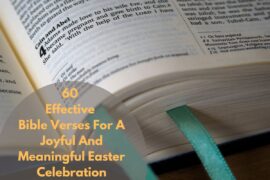To address God with adoration, confession, supplication, or gratitude; to make a request in a humble manner. Prayer is a human act of communicating with the holy or sacred—God. Every religion has practiced prayer at some point in time, and it can take many different forms. A significant and common feature of all religions is prayer.
Contents
How long should we pray according to the Bible?
The Bible doesn’t specify a specific amount of time that you should spend praying. The only thing it says is that you should pray with your whole heart (Matthew 6:6).
However, if you are looking for ideas on how long to pray, the Bible does offer some clues. It says that the Lord is near (Psalms 103:5) and that he desires to hear from his people (Psalms 85:1). These two passages suggest that you should spend at least part of your time in prayer connecting with God and telling him about what’s on your mind.
The frequency of our prayers and the attitude we bring to them are more important than how long we pray. Some insist that we should pray for an hour in an effort to appear pompous They cite Jesus’ request of His disciples, “Won’t you watch with me for an hour?” as their justification.
(Mk.14:37).
The truth is that there is no time limit on how long prayers should last in the Bible.
Jesus offered both brief and lengthy prayers. His prayer was brief as he stood by Lazarus’s corpse (John 11:41-42). But as He prepared to select His followers, He prayed all night (Lk.6:12-16).
His prayer in the Garden of Gethsemane was fervent yet brief (Lk.22:39-46). The length of your daily and hourly prayers relies on a number of variables. It depends on what you need, how you feel inside, what burdens or duties you have, how much time you have, and how important you think prayer is to you. Because they have more duties and worry more about their family as they age, parents have a tendency to recite longer prayers than their children.
There’s no denying that the influence of social media, television, and cell phones has changed the way we pray today. Moses endured the load of a nation that was difficult to control and remained on the Mountain for 40 days.
How often should we pray Bible verse?
Purpose: To remind us that prayer is a constant effort, not just a single event. Prayer should be a regular part of our lives, not something we do once or twice a month.
1 Thessalonians 5:17 KJV
Pray without ceasing.-
1 Thessalonians 5:17 KJV
Examples: Praying at mealtime, before bedtime, and when we start up our day. Jesus who is the role model for every Christian doesn’t specify how often we should pray; He just believes we will.
But Jesus’ own example offers a solution. Jesus “frequently retired into lonely areas and prayed,”.
Although Luke doesn’t specify how frequently Jesus prayed, his remarks suggest that he did so frequently. I believe it is safe to presume that Jesus kept the fixed prayer times maintained by His fellow Jews. There are several hints that indicate that way.
As “the custom of the Law required,” Jesus’ parents observed the Old Testament requirements pertaining to circumcision, purification, presentation of babies to the Lord, and sacrifice (Luke 2:21-27).
Additionally, Luke 2:41-42 states that they traveled to Jerusalem for Passover each year “according to the tradition.”
Jesus “went to Nazareth… and on the Sabbath day, he went into the synagogue, as was his custom,” according to Luke 4:16.
The early church members “devoted themselves… to prayer,” according to Acts 2:42.
The NIV renders the Greek plural with an English singular without more explanation.
The prayer or prayers referred to in this passage most likely allude to daily times set aside for prayer.Acts 17:2 KJV
And Paul, as his manner was, went in unto them, and three sabbath days reasoned with them out of the scriptures.-
Acts 17:2 KJV<
Finally, Acts 17:2 states that Paul entered the synagogue “as was his custom, and on three Sabbath days he reasoned with them from the Scriptures.”
The conclusion drawn from these hints is that Jesus carefully observed Jewish traditions, such as Sabbath observance, synagogue attendance, and prayer, as instructed by His parents and imitated by his disciples.
We should imitate Jesus if we desire to experience God through prayer. Making time for twice-daily biblical meditation and prayer is the very minimum here.
According to Psalm 1:1–2, a person who is blessed by God “meditates on his law day and night.”
After we have formed healthy spiritual habits, prayer will eventually become as natural to us as breathing; we will then always be praying.
How often should we pray, then? frequently, sporadically, and always! Does the Bible tell us how to pray?
The way we communicate with God is through prayer and Jesus Christ the son of God has given us the manner in which we should pray.
We can read some of Jesus’ opinions on prayer in Luke 11:1–13.
Luke’s Gospel makes it clear that Jesus prayed frequently (Luke 3:21; 5:16; 6:12; 9:18, 28).
Luke 11:1 KJV
And it came to pass, that, as he was praying in a certain place, when he ceased, one of his disciples said unto him, Lord, teach us to pray, as John also taught his disciples.-
Luke
Undoubtedly impressed by Jesus’ intercession, His disciples ask Him to teach them how to pray in this text. When you pray, Jesus begins by saying in His instruction. When it comes to a disciple of Christ, prayer is a matter of when and not if. This is not to imply that prayer is some coldhearted demand; rather, it is the inevitable outcome of the conviction that there is God.
Matthew 6:9–13 KJV
After this manner therefore pray ye: Our Father which art in heaven, Hallowed be thy name. Thy kingdom come, Thy will be done in earth, as it is in heaven. Give us this day our daily bread. And forgive us our debts, as we forgive our debtors. And lead us not into temptation, but deliver us from evil: For thine is the kingdom, and the power, and the glory, for ever. Amen.-
Matthew 6:9–13 KJV
What is currently referred to as “The Lord’s Prayer” is what comes next.
Matthew 6:9–13 also mentions the prayer. Both passages share a lot of similarities.
The main distinction is that Luke’s version has a few places where it is breezier.
Even so, the ideas are presented in the same order and share the same principles.
The prayers are also documented in various settings. According to Matthew, Jesus recited this prayer in front of a sizable crowd at the Sermon on the Mount.
The lord’s prayer is actually our pattern for prayer?
Luke suggests that Jesus’ response to the disciples’ query on how to pray included prayer.
While I do believe that praying the prayer exactly is productive, it’s also necessary to think about the ideas it contains.
1. OUR FATHER
Jesus first advises us to address God as a father. Our Heavenly Father is God. Many people find it unflattering to think of God as their father. A painful father’s absence or presence can frequently result in severe suffering. But our Heavenly Father has everything our earthly fathers are missing. More than we can possibly comprehend, He loves and cares for us He wants to bestow upon us good things, including His presence through the Holy Spirit (Luke 11:13).
Using the word “father” to describe Him is definitely too formal. It would be better to say, daddy. Of all His creation, He values us the most. He is our father, and He is concerned about all of our needs.
2. HALLOWED BE YOUR NAME
Jesus then instructs us to pray, “Hallowed be your name.” In essence, this is an expression of thanks to God for His perfection. It is a declaration that He is deserving of having His name declared Holy. In the same way, we should begin our prayers to Him by praising Him for His amazing qualities and His dependable nature.
In our prayers, we should convey these things to God, just as we did last week when we thought about the things we should adore God for. King David was an expert at crafting psalms of prayer that gave God the honor He deserves. Think of Psalm 100.
When we pray to Him, we should give Him praise for the good things He has accomplished.
The people He has placed around us, the air we breathe, the mind He has given us to think with, the body He has given us to work with, the sun He has given to illuminate our days, and the moon to rule our nights. He has given us all of these things as excellent gifts.
He certainly merits every accolade we can muster!
3. THY KINGDOM COME
Our prayers should also include a request for the establishment of God’s Kingdom.
The phrase “your Kingdom come on earth as it is in heaven” is used in Matthew’s version.
Luke’s rendition conveys the same idea in a briefer manner. In order for His authority to rule in our hearts and His will to be carried out in our lives, we must pray for God’s kingdom to come.
I trust in a God who orchestrates everything for the benefit of people who adore Him (Romans 8:28). As a result, I respect His power over me and completely rely on Him.
Because His will is “good, pleasant, and perfect,” I also want His will to be carried out in my life (Romans 12:1-2).4.
4. GIVE US THIS DAY OUR DAILY BREAD
According to Jesus, we should pray that God will meet our basic requirements.
The assertion acknowledges our reliance on God.
Being completely dependent on someone is probably not very popular in our independent-minded culture.
Nevertheless, it should come as no surprise. Two people were all that separated us from extinction. Our current achievements owe a great deal to those made by those who came before us. The natural rules of the cosmos are what allow us to function. Everything we need to function in this life depends on entities and individuals outside of us. Our main reliance is on God. Even the most fundamental necessities of life depend on Him.5.
5. FORGIVE US OUR SINS, AS WE FORGIVE THOSE WHO SIN AGAINST US
We not only rely on God for our essential needs but also on Him and Him alone for our spiritual needs. We fall short of obeying God’s charge to love Him and our neighbors as ourselves. The Bible makes it quite plain that only God’s forgiveness via Jesus Christ can bring about our redemption (To name a few passages: John 3:15-18; John 14:6 Romans 3:20-23; II Corinthians 5:14-17; I John 5:11-13).
We all commit sin. Because of our arrogance, we disregard God’s authority in our life, prioritize our own goals over His, fail to recognize our total dependence on Him, and pursue justice instead of our own interests (Micah 6:8). As opposed to loving our neighbors, we are self-centered and pursue our own happiness.
Because of our sins, we are in absolute need of forgiveness. It’s interesting to note that after instructing his followers to petition God for forgiveness, Jesus goes on to explain that we should do the same, forgiving others as we have been forgiven. A forgiving-loving spirit is a trait of someone who has experienced God’s forgiveness.
6. AND LEAD US NOT INTO TEMPTATION
This final part of the prayer places a strong focus on protecting us from the very real force of temptation. The truth is that we face several temptations every day to break our promises to God, our families, our friends, our coworkers, our employers, and our neighbors. When and wherever we face temptation, we can have faith that God is there to help us. As I Corinthians 10:13 reminds us, “No temptation has overtaken you but what is common o man.
Furthermore, God is dependable; he won’t subject you to more temptation than you can withstand. But he will also offer a way out if you are tempted, enabling you to resist the temptation. Now let’s review. Jesus provides his disciples with a prayer to pray.
While it is beneficial for us to pray the bible as it is presented, it is equally crucial that we comprehend what we are saying.
We should approach Him as our adoring father, acknowledge His goodness and holiness, request His direction and will for our lives, acknowledge and seek His provision for our necessities, come humbly before Him to ask for forgiveness and ask for His strength to withstand the temptations we face in this life.
How many times does the Bible tell us to pray?
The Bible is full of simple prayer examples. Four verses are devoted to Moses’ plea for mercy to the Lord at a critical juncture (Deut. 9:26–29). In two verses, Elijah prayed atop Mount Camel to uphold God’s honor (1 Kings 18:36–37). The prayer of Nehemiah spans up to seven verses (Neh. 1:5–11). In chapters 9 and 10, Daniel prayed in a moderate manner. Paul prayed quickly yet powerfully (e.g., Phil. 1:9–11; Col. 1:9–12). Even the brief High Priestly Prayer of our Lord, found in John 17, is condensed.
1 Thessalonians 5:17 KJV
Pray without ceasing.-
1 Thessalonians 5:17 KJV
The Bible is full of simple prayer examples. Four verses are devoted to Moses’ plea for mercy to the Lord at a critical juncture (Deut. 9:26–29). In two verses, Elijah prayed atop Mount Camel to uphold God’s honor (1 Kings 18:36–37). The prayer of Nehemiah spans up to seven verses (Neh. 1:5–11). In chapters 9 and 10, Daniel prayed in a moderate manner. Paul prayed quickly yet powerfully (e.g., Phil. 1:9–11; Col. 1:9–12). Even the brief High Priestly Prayer of our Lord, found in John 17, is condensed.
How many hours should we pray?
EXAMPLES FROM THE NEW TESTAMENT
Jesus regularly prayed for several hours.
He occasionally spent the entire night in prayer before reporting for work the next day.
The apostle Paul never stopped praying.
He prayed continuously with a variety of prayers, and he taught us to do the same and never stop praying.
EXAMPLES FROM CHRISTIAN LEADERS OF THE PAST
Every day, Martin Luther prayed for at least two hours. He once asserted, If I don’t spend two hours in prayer every morning, the devil wins the day. I must spend three hours a day in prayer because I have so much work to do’.
The major reformer who oversaw the Protestant Reformation was Martin Luther.
John Wesley spent two hours a day in prayer. He was the founder of the Methodist church and a powerful man of God.
Every day, George White field spent at least three hours in prayer (1hr in the morning, 1hr at noon, and 1hr in the evening). In both England and America, he was a renowned evangelist. E. M. Bounds spent three hours each day in prayer. Around the time of the American Civil War, he served as a pastor. Each day, he spent three hours in prayer before starting to write. His books on prayer are among the most influential ones ever written. One of the most devoted prayer warriors this planet has ever known was John Welch. He prayed and studied God’s Word for at least seven or eight hours every day.
After his death, an elderly man said of him, “He was a symbol of Christ.”
We ought to spend as much time as we can in prayer each day.
There is never enough time for prayer.
There is no such thing as excessive prayer.
There is just inadequate prayer.
Because God can do everything via prayer.
How many hours should a pastor pray?
Every Christian should make an effort to pray “without ceasing,” as the Bible instructs.
The Bible never instructs Christians on the length or frequency of their daily prayers, but it does provide examples of godly men and women that we would be good to imitate.
The Bible frequently describes how God’s people had two distinct approaches to prayer.
The first thing they did was spend some time alone with God. It was a distraction-free period of focused prayer.
They also had a period of time during the day when they went about their business and took care of their obligations, but they did it all the while being in close contact with God.
Pastors and all Christians should make an effort to “pray without stopping,” but a decent practice would be to pray for at least an hour each day.
But it’s crucial to note that there shouldn’t be a difference between the spiritual lives of a pastor and those of regular believers.
Romans 1:9 KJV
For God is my witness, whom I serve with my spirit in the gospel of his Son, that without ceasing I make mention of you always in my prayers;-
Romans 1:9 KJV
All Christians are expected to spend a lot of time in prayer and to have a strong relationship with God.
According to the Bible, every Christian is a representative of Christ, and everything the apostles learned from Jesus was intended to be passed on to all Christians.
I am aware, nevertheless, that church pastors and elders are frequently placed in challenging circumstances and are frequently asked to act wisely or offer godly counsel.
If the elder is not in a deep connection with God, it would be quite challenging to accomplish all of this.
Therefore, as was previously said, there isn’t a specific scriptural directive that says “Laymen should pray for one hour a day and leaders should pray for at least two hours a day.”
To “abide in Christ,” “live in the secret place,” “walk in the Spirit,” and “pray without ceasing” are commands found in the Bible.
It’s also vital to note that both pastors and non-pastor are subject to these instructions. Spending more time in prayer does not make one more righteous or spiritual. It is a connection. It matters more what you do during that time. Reading and reflecting on God’s word, listening to God, praising God, and praying are typically included in the time allotted for prayer. Many people occasionally engage in these activities. Additionally, they pray before God on behalf of all peoples, nations, and souls.








